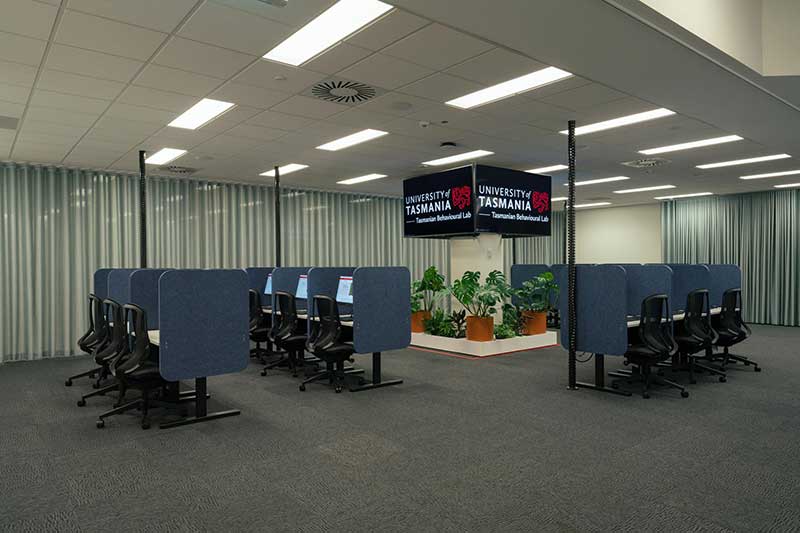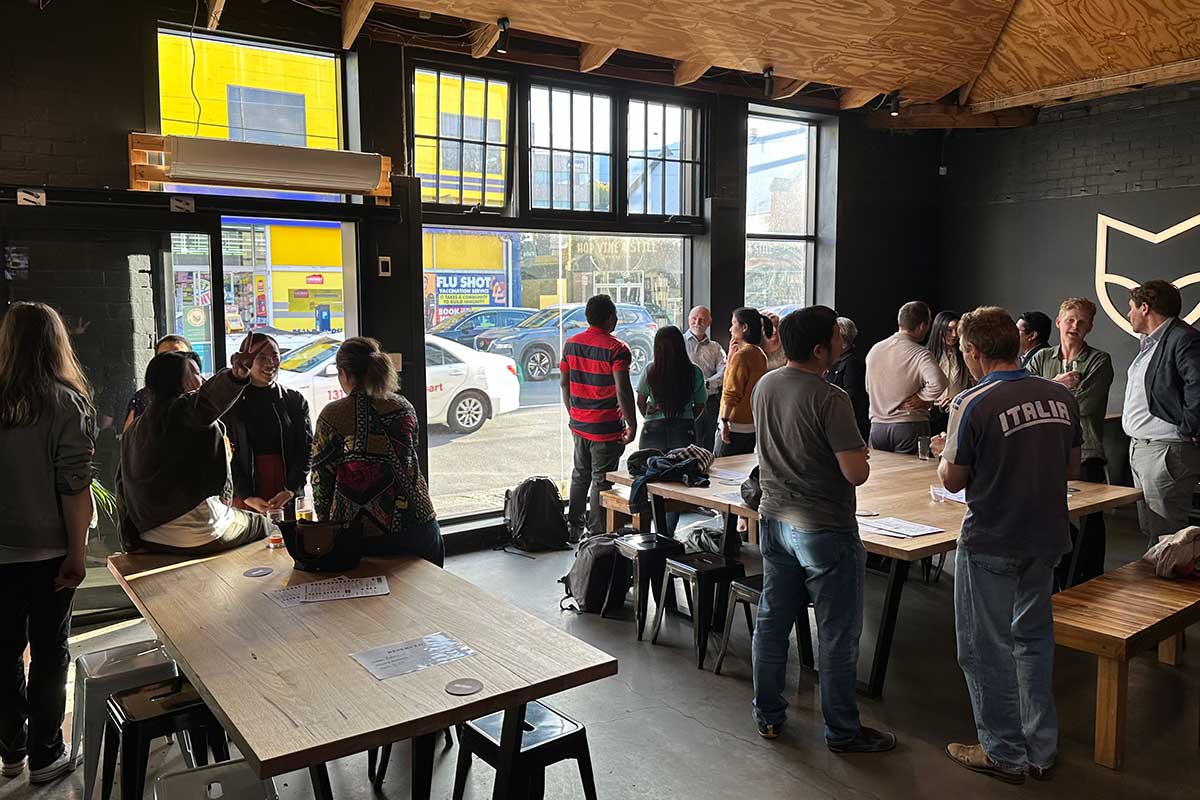Welcome to the Tasmanian Behavioural Lab (tas.be.lab)
Good decisions improve the quality of an individual’s life. Good decisions across society enhance social welfare and advance human progress. In an increasingly complex and interconnected world, proliferating information makes choice ever more difficult. Behavioural science is a cross-disciplinary field that draws on scientific insights and research methods from behavioural economics, psychology and cognitive science to understand how people behave and make decisions.
At tas.be.lab, we use behavioural science to help improve how individuals, organisations and governments make decisions in critical contexts such as work, health, the environment and the marketplace. We create impact through studying, teaching and deploying behavioural insights, methods and interventions in collaboration with the public sector, NGOs and business, and by participating in public debate.
If you would like to learn more about how we can work together to use behavioural science to improve our future decisions, we invite you to get in touch.
Professor Swee-Hoon Chuah
Professor of Behavioural Economics
The University of Tasmania
Capabilities
Behavioural science uses methods and insights about how humans think and act to design effective policies. tas.be.lab brings our behavioural expertise to work with partners and clients in policy and practice.
We offer solutions at every stage of the intervention process, from problem identification to testing of solutions. Alternatively, our partners may choose to “mix and match” from our capabilities depending on their needs and expertise.
Problem
What’s the problem, exactly? You need to be able to articulate your issue to design the right interventions to fix it. We help partners diagnose and identify their policy challenges in behavioural terms - based on the underlying psychological drivers.
Science
What do we know already? It’s hard to keep up-to-date with the latest research that applies directly to your challenge. tas.be.lab conducts reviews of cutting-edge behavioural science directly relevant to you. We produce reports that highlight the key takeaways in plain English.
Intervention
How do we fix it? tas.be.lab co-design the right behavioural interventions to address your policy challenges. Our designs bring behavioural change tailored to your context and objectives.
Evaluation
Has it worked? We evaluate your policies and interventions. tas.be.lab designs and run experiments in the right contexts (online, in the field or lab) to establish whether your policies are fit for purpose.
Data
What’s your evidence base? You have amassed data about customers, employees, your markets or industry. We use the latest statistical tools to tell you what the data say for better policy insight.
Facilities

The brand new tas.be.lab facility is located at 100 Melville Street in central Hobart. The facility doubles as a state-of-the-art working experimental laboratory as well as training and discovery centre.
It has seating for up to 30 participants or delegates and is partitionable into two rooms.
The lab features PCs with the latest software, removable desks partitions, reception area, kitchen and two control rooms.
It is available for hire for training seminars or research studies
tas.be.lab maintains a database of potential study participants which include students and staff from the University as well as members of the community. If you are interested in receiving invitations to participate in one of our studies, please join our participant database.
Our work
At tas.be.lab we apply behavioural insights and methods to the issues and topics that concern our clients and collaborators from the community, business and government. Our work covers a broad spectrum of economic, environmental, health and social welfare decision-making, from which the following common themes have emerged.
Study with us
At tas.be.lab we have significant experience in designing and delivering executive education courses internationally. If you are looking for professional behavioural science training, please look at our Graduate Certificate in Behavioural Insights. Alternatively, we can co-design a tailor-made programme based on your organisation’s needs and priorities.
We offer a Graduate Certificate as well as a range of short courses for postgraduates and practitioners seeking to upskill and develop capabilities in behavioural insights.
Core units of study:
We offer several behavioural-flavoured units of study for undergraduates in business and economics or as breadth study options for students in other degrees.
We offer higher degree research projects tied to scholarships with an annual stipend.
Available HDR projects
- Discrimination in Organisations
Current HDR projects
- Prasad Alahakoon: Online experiments to study impact of moral foundations on preferences for income distributions (externally supervised RMIT student).
- Zoya Cheraghi: Scaling-up adoption of cooperative small-scale forestry in Tasmania: Insights from behavioural economics
- Alanda Kariza: Examining social labelling and priming as nudging techniques to Increase entrepreneurial self-efficacy and entrepreneurial intention among Tasmanian youth.
- Lois Onigbinde: Assessing the efficacy of nudging techniques for prompting business start-ups in Tasmania.
- Sergio Orjuela Ruiz: Interventions to boost cultural participation at the Buenos Aires Film Festival (externally supervised RMIT student).
- Amara Steven: Untangling economic risk, perceptions and trade-offs in the Blue Economy
- Tram Tran: Developing volunteer leaders: A quasi-experimental trial of leader development among paid and volunteer leaders.
- Ayobolawole Ogundipe: Behavioural bias of managerial overconfidence and its impact on capital structure decision-making and environmental, social governance performance of listed companies around the world
Past HDR projects
- Huong Giang Pham: Discrete choice experiments to explore Vietnamese farmers’ preference for the adoption of sustainable agricultural practices (RMIT).
- Rochelle Wilson: Promising Responsibly: An Experimental Study on Partial and Conditional Promises (RMIT).
- Johanna Prasch: Experimental interventions to increase social inclusion and cooperation in multicultural settings (RMIT).
- Rizal Adi Prima: Lab-in-the-field experiments to study misreporting and dishonesty in asset reporting in the new Indonesian social welfare system (RMIT).
- Ryan Sanjaya: Lab-in-the-field experiment to study causes and impact of inter-ethnic violence in Indonesia (RMIT).
- Jeremy Larner: Experiments to study persuasion and social behaviour in online environments and virtual worlds (University of Nottingham).
- Recep Yücedoğru: Survey about the effects of religiosity on corporate tax morale and compliance within Turkish SMEs (University of Nottingham).

Activities
The Tasmanian Behavioural Network (tasbenet) is an informal platform for anyone in Tasmania with a professional interest in behavioural science and its applications – including researchers, practitioners and policymakers. We welcome anyone who shares these interests to join in our activities. Please email us to register interest or to make suggestions for events and activities. We do not maintain an email list but will advertise all events below.
Sign up for the tasbenet LinkedIn group
Hobart Round Table
The tasbenet Round Table is an informal monthly gathering in a social atmosphere. All welcome – no confirmation required. Please check back on this page in case there are last-minute changes to the programme.
| Date | Time | Venue |
|---|---|---|
| Friday, 16 February 2024 | 17:30 | In The Hanging Garden (downstairs Cathedral section), 112 Murray Street, Hobart |
| Friday, 15 March 2024 | 17:30 | In The Hanging Garden (downstairs Cathedral section), 112 Murray Street, Hobart. Special Guest: Ryohei Hayashi (Tokai University) |
| Friday, 13 September 2024 | 17:30 | Venue TBC. Special Guest: Alex Gyani (Director, BIT Australia) |
| Saturday, 1 June 2024 | 17:30 | Fox Friday, 105 Murray Street |
Books and reports
- Emergent Adulthood: Review of Literature (for the Youth Network of Tasmania)
- Applying insights from behavioural economics to increase volunteering (for Volunteering Australia)
- Behavioural Business: The Psychology of Decisions in Economy, Business and Policy Contexts (Springer)
- Applying behavioural insights to online wagering (with the Behavioural Economics Team of the Australian Government ) (Video)
In the media
The Conversation
- Recruiting for the modern military: new research examines why people choose to serve and who makes the ideal soldier
- Are nudges sinister psychological tricks? Or are they useless? Actually, they are neither
- Male artists dominate galleries. Our research explored if it’s because ‘women don’t paint very well’ – or just discrimination
- Inflationary psychology could make things worse, but for now it’s in check
- We’re obsessed with shows about con artists like Inventing Anna: the fascination lies in how easily these people can dupe us
- Gamblers bet more when in the dark: feedback can curb their online losses
- Why lotteries, doughnuts and beer aren’t the right vaccination ‘nudges’
- From UFOs to COVID conspiracy theories, we all struggle with the ‘truth out there’
- The commuter’s paradox: there’s something to gain in the space between home and work
- Even with a vaccine, we need to adjust our mindset to playing the COVID-19 long game
- Beyond the police state to COVID-safe: life after lockdown will need a novel approach
- Playing the COVID-19 blame game may feel good, but it could come at a cost — the government’s credibility
- What to do with anti-maskers? Punishment has its place, but can also entrench resistance
- Explainer: how our understanding of risk is changing
- Hard work, not ‘Confucian’ mentality, underpins Chinese success overseas
- Thomas Schelling: the legacy of a master strategist
- Behavioural Lab signs MOU to reduce maternal mortality in Timor-Leste